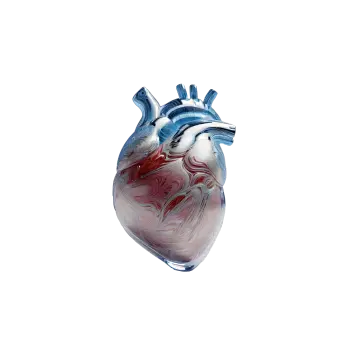Quick version
Heart problems include heart failure, arrhythmias, and heart attacks, with symptoms such as chest pain, shortness of breath, fatigue, dizziness, and swelling in the legs. Regular health check-ups, such as cholesterol and NT-proBNP tests, along with lifestyle changes like a healthy diet, exercise, and stress management, can strengthen the heart and prevent diseases.
Common Symptoms of Heart Problems
- Chest Pain
- Shortness of Breath
- Unusual Fatigue
- Dizziness and Fainting
- Swelling in the Legs and Feet
By understanding and acting on the body's signals, you can prevent heart problems and live a healthier life. Investing in your heart health is an investment in your future. Remember: The heart doesn't wait—act in time.
What constitutes a heart problem?
The term "Heart Problem" is a collective name for a range of conditions that affect the heart's function. These can include everything from atherosclerosis, atrial fibrillation, heart failure, to irregular heartbeats (arrhythmias) and congenital heart defects. These conditions are not only common but also potentially life-threatening if not detected and treated in time.
According to the World Health Organization (WHO), cardiovascular diseases are the leading cause of death globally, claiming more lives than any other disease. Recognizing the symptoms of heart problems can therefore be the difference between life and death. But how do you know if something is wrong? The heart's warning signs can be subtle and sometimes mistaken for less serious issues. By learning to recognize these signs, we can act in time and give the heart the attention it deserves.
Five common signs of heart problems
Understanding and reacting to the body's signals can be crucial in preventing severe complications. The heart is excellent at signaling when something is wrong, but symptoms can sometimes be vague and easy to overlook. Here are some of the most common signs of heart problems and what they may indicate:
1. Chest pain
Chest pain is often the most well-known and serious sign of heart problems, particularly during a heart attack. The typical pain is described as a sensation of pressure, heaviness, or burning pain across the chest. It can radiate to the left arm, jaw, neck, or back, and is sometimes mistaken for heartburn or muscle pain.
Why does this happen?The pain is caused by a lack of oxygen in the heart muscle, often due to a blockage in one or more coronary arteries. This condition, known as angina or a heart attack, requires immediate medical attention.
When should you act?If the pain is sudden, persistent, or accompanied by symptoms such as cold sweats, shortness of breath, or nausea, do not hesitate to call emergency services. Time is critical in suspected heart attacks.
2. Shortness of breath
Unexpected or worsening shortness of breath, particularly at rest or during mild exertion, can be a subtle but important warning sign of heart problems. Many dismiss it as natural aging or poor fitness, but it may indicate serious underlying conditions such as heart failure, where the heart struggles to pump blood effectively, or blockages in the coronary arteries limiting blood flow to the heart muscle.
Shortness of breath can also present as a feeling of not getting enough air, a suffocating heaviness in the chest, or an inability to fully fill the lungs. This type of breathing difficulty may worsen when lying down, often a sign of fluid accumulation in the lungs, known as pulmonary edema. In some cases, it may also be linked to temporary rhythm disturbances in the heart, such as atrial fibrillation.
Act promptlyIt is important not to ignore this signal, especially if the shortness of breath occurs suddenly or becomes increasingly severe. Seeking medical care early can help prevent potentially life-threatening complications and ensure timely treatment.
3. Unusual fatigue
Extreme and unusual fatigue that does not improve with rest can be a subtle but significant sign of heart problems, especially in women. This fatigue is often described as a feeling of complete exhaustion, even after adequate sleep or rest, and may appear suddenly or gradually without a clear cause. In some cases, fatigue is one of the earliest symptoms of heart problems and can occur days or weeks before other more obvious signs, such as chest pain or shortness of breath. This is often due to the heart's inability to pump enough blood and oxygen to the body's tissues, a common issue in conditions like heart failure or coronary artery disease.
Important! Unusual fatigue can impact daily activities and should be taken seriously, especially if it is persistent and unexplained.
4. Dizziness and fainting
Sudden dizziness or fainting can indicate that the heart is not pumping blood effectively, resulting in insufficient blood supply to the brain. This is often related to irregular heartbeats (arrhythmias) or low blood pressure. Arrhythmias such as atrial fibrillation or ventricular tachycardia can also cause a temporary reduction in blood flow to the brain, leading to dizziness or fainting sensations.
Consult a healthcare providerIf you experience dizziness regularly, especially during physical activity or alongside other symptoms, it is important to undergo a cardiac evaluation.
5. Swelling in the legs and feet
Fluid retention in the lower legs, ankles, or feet can be a sign of heart failure, especially if accompanied by weight gain or shortness of breath. Many view this as a minor issue, but it may signal a serious underlying heart condition. When the heart does not pump blood effectively, fluid can start to accumulate in the body's tissues. This phenomenon, known as edema, is particularly common in chronic heart failure. If the swelling does not subside after rest or is combined with shortness of breath or other symptoms of heart failure, contact a healthcare provider for further assessment.
How to prevent and strengthen your heart
Taking care of your heart early creates good conditions for both quality and longevity of life. In addition to adopting heart-friendly lifestyle changes, regular health check-ups can be crucial in identifying risk factors early. Blood tests measuring cholesterol, blood sugar, and specific cardiac markers, such as NT-proBNP, can provide valuable information about heart health and potential signs of heart failure. Simple measures, such as maintaining a healthy diet, exercising regularly, and managing stress, strengthen the heart and improve blood circulation. By combining a healthy lifestyle with proactive medical check-ups, you can effectively prevent cardiovascular diseases and ensure your heart remains strong throughout life.
1. Healthy diet
Prioritize heart-friendly foods such as fatty fish, nuts, fruits, and vegetables. Limit salt, sugar, and saturated fat.
2. Regular physical activity
150 minutes of exercise per week, such as walking or swimming, strengthens the heart and improves circulation.
3. Monitor blood pressure and cholesterol
Regular health check-ups can help detect risk factors early, especially monitoring your blood pressure.
4. Stress management
Practice relaxation techniques such as mindfulness to lower stress levels, which can negatively impact the heart.
5. Quit smoking
Smoking damages blood vessels and worsens cardiovascular diseases. Quitting is one of the most effective steps for heart health.























